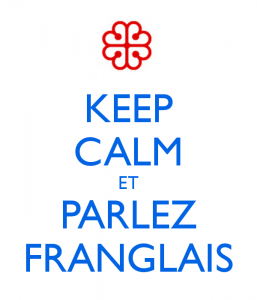Parlez-vous (do you speak) Franglais?
Table of Contents
Do you parlez Franglais? Franglais est un langue made up of le français et l’anglais, parce-que your French is très terrible or pour le comedic effect. J’aime Franglais; if je ne sais pas a word, je replace it avec English. Un francophone will ne comprende pas, mais c’est très funny.
Quoi?
I’ll write in English now, because apparently I don’t even remember enough of my school French to really badly mash it together with English. If you didn’t understand any of the words there, hopefully you got enough to work out that Franglais is a silly “language” made up of English and terrible French (that’s the French skill that’s terrible, not that actual language). In French, “franglais” usually refers to imported English words, but we’re not going to talk about them. Franglais is great fun, but I advise against trying to use it in front of a native French-speaker. If you’d like to have a go though, all you need is some rudimentary French and a sense of humour.
Franglais in les livres
You can find Franglais in English literature as far back as Chaucer (1300s), as well as in one of William Shakespeare’s plays, ‘Henry V’, so we’ve clearly thought that completely mangling the French language is funny for a long time.
 The great American author Mark Twain also dabbled in a bit of Franglais, including a letter to a Parisian landlord in his travel book ‘Innocents Abroad’. He asked, “Pourquoi don’t you mettez some savon in your bed-chambers?” or “Why don’t you put some soap in your bed-chambers?” and goes on to say that, “Savon is a necessary de la vie to any body but a Frenchman!” While his letter is a humorous telling off to the landlord who ripped him off, I don’t endorse his stereotyping and insulting of the French (well, not much anyway; it is quite funny).
The great American author Mark Twain also dabbled in a bit of Franglais, including a letter to a Parisian landlord in his travel book ‘Innocents Abroad’. He asked, “Pourquoi don’t you mettez some savon in your bed-chambers?” or “Why don’t you put some soap in your bed-chambers?” and goes on to say that, “Savon is a necessary de la vie to any body but a Frenchman!” While his letter is a humorous telling off to the landlord who ripped him off, I don’t endorse his stereotyping and insulting of the French (well, not much anyway; it is quite funny).
Back to the UK in slightly more modern times, a man called Miles Kington published a series of cartoons in the famous ‘Punch’ magazine, starting from the 1970s, and made Franglais pretty popular in Britain. These cartoons were collected in a series of books, including ‘Let’s Parler Franglais!’ and ‘Let’s Parlez Franglais One More Temp’.
Frenchifying English
A great way to play with Franglais is to translate English expressions or idioms word for word into French, or vice-versa. If you’re looking to confuse a French-speaker, this is probably the way to do it. The genius of Franglais is it doesn’t matter how badly translated it is. J’aime Franglais beaucoup. Next time it’s raining, maybe you’ll want to say, “Il pleu des chats et des chiens” instead of “it’s raining cats and dogs”. I guarantee it will make no sense, as the French say “it’s raining frogs”.
You can also have fun bestowing English meaning onto French words. I recall a cartoon I saw as a child, of three cats sinking in a boat (un deux trois quatre cinq).
So, parlez-vous Franglais? Or maybe you’d like to tell us about your excellent Spanglish or Germglish?


